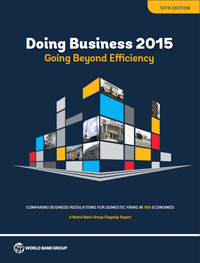Papua New Guinea has fallen two places in the latest World Bank Group assessment of the ease of doing business in world economies, released last week.
 This year’s edition of the report placed PNG 133rd out of 189 economies, placed between Ethiopia and Kiribati.
This year’s edition of the report placed PNG 133rd out of 189 economies, placed between Ethiopia and Kiribati.
Of concern for PNG’s business community, PNG was one of only 33 countries not to improve their overall business environment in the past year, according to the survey. PNG recorded a slight improvement in its ranking in only one of the ten criteria the survey uses to measure the ease of doing business—that for getting electricity (in which PNG ranks comparatively highly, at 26th).
Its ranking fell slightly in seven others, most notably in starting a business. According to data collected by Doing Business, starting a business in PNG requires 6.0 procedures and takes 53.0 days.
Singapore is the top-rated economy for ease of doing business in this year’s survey, followed by New Zealand, Hong Kong, Denmark and South Korea. Eritrea was the lowest-ranked country.
Elsewhere in the Pacific region, economies like Solomon Islands and Vanuatu were commended for regulatory reforms implemented during the past year. Solomon Islands jumped 10 places up the overall rankings to 87th after getting electricity was made easier by improving procurement practices for the materials needed to establish new connections. Vanuatu’s ranking rose for making property transfers faster by digitising its land registry system, and hiring and training new staff.
Samoa was the leading ranked Pacific nation at 67, with Tonga at 69, Vanuatu at 76 and Fiji at 81.
The 2015 report used 10 measures to rank the countries, including starting a business, dealing with construction permits, getting electricity, registering property, getting credit, protecting minority investors, paying taxes, trading across borders, enforcing contracts, resolving insolvency and labour market regulations.








Speak Your Mind